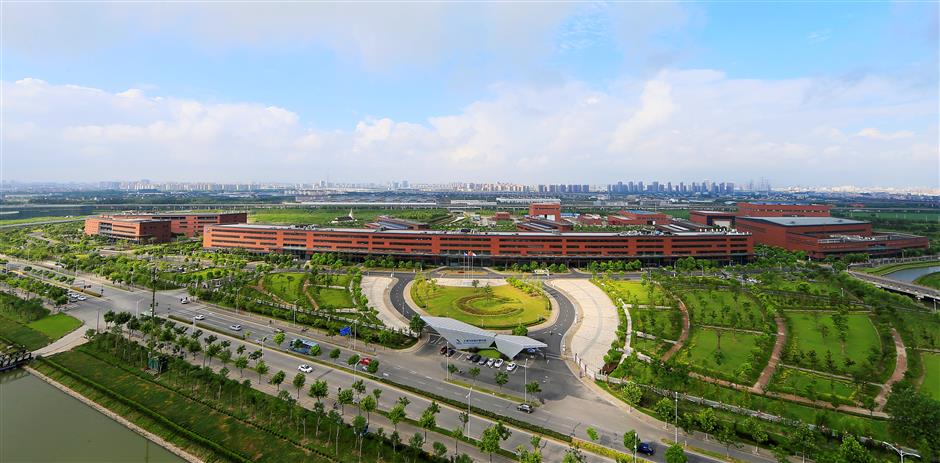A promised land, Zhangjiang attracts and retains talent
In Pudong, heartland of the city’s top-notch talent, entrepreneurs and researchers in Zhangjiang are upgrading the free trade zone to create a national science center and support Shanghai’s ambition to become a global innovation center.
The sci-tech arm of the FTZ is now home to more than 80 percent of Shanghai’s professional and technical workforce or one sixth of China’s total.
Half of the entrepreneurs here once studied or lived overseas. More than 45,000 overseas returnees have launched their businesses here.
Zhangjiang is also home to 170 academics and 700 experts included in China’s “Thousand Talent” Program.
A promised land, Zhangjiang has a clear strategy to attract and retain more talent.

A researcher makes tests at the National Shanghai Center for Drug Safety Evaluation and Research in Zhangjiang.
Zhou Hong, general manager of Shanghai Roche Pharmaceuticals Co, was the first expat to be granted permanent residence through the FTZ.
The German citizen, the No. 001 “green card” holder, is leading the first foreign-funded pharmaceutical company registered in Zhangjiang. Shanghai Roche has benefited from cross-border yuan-denominated two-way capital pools, record-filing for foreign investment and policies to boost headquarters economy.
The institutional innovations are part of the efforts to upgrade firms in Zhangjiang from “Chinese makers” to “Chinese creators.”
A cancer drug has gone to the China market quickly through the so-called marketing authorization holder program. Fruquintinib capsules, developed by Hutchison MediPharma in the Zhangjiang Pharma Valley, is China’s first independently developed drug for the treatment of metastatic colon cancer. It was approved for public use by the National Medical Products Administration in September.
The program enables pharma research and development groups to use contract manufacturers to produce drugs in China.
Previously, those groups had to build their own production facilities or transfer the technology if they lacked the funds to do so. In essence, a license to manufacture drugs was tied to drug approval, a system that brought low returns to developers of new drugs.
“Without the new system, Fruquintinib would not have reached the shelves so quickly,” said Wu Zhenping, senior vice president of Hutchison MediPharma.
The transit and upgrade of manufacturing and the shift of economy have been good for the development of biomedicine, next-generation information technology and intelligent equipment for smart production.
General Electric Company, which started its Chinese business early last century, will focus on aeronautics, power generation and renewable energy in the future.
The American multinational conglomerate has more than 20,000 employees in China and R&D centers in eight cities, including one in Zhangjiang.
The ongoing China International Import Expo features a 500-square-meter GE pavilion featuring achievements in digital technology for aviation, power, health care, renewable energy, oil and gas industries.

Zhangjiang is striving to create a national science center and support Shanghai’s ambition to become a global innovation center.
A digital health care experience center displays CT, high-end 3.0T MRI and four-dimensional color Doppler ultrasound, and services from power generation to the consumer end and digital assembly, intelligent welding, and 3D printing.
GE’s Chinese headquarters, Chinese R&D headquarters, the Asia-Pacific center of its global operations as well as a “digital foundry” are all located in Zhangjiang. It has invested more than US$1.2 billion and set up over 30 joint ventures in Shanghai.
“Made in Shanghai” means localization by integrating global resources, to use GE’s technology in intelligent manufacturing.
GE is selling products developed in China to the international market. It set up the GE China intelligent manufacturing technology center in Shanghai last year, the first intelligent manufacturing center serving multiple business sectors outside the United States.
The center will form a strong global network with the six GE global intelligent manufacturing technology centers, focusing one-stop intelligent manufacturing solutions for local manufacturers.

















